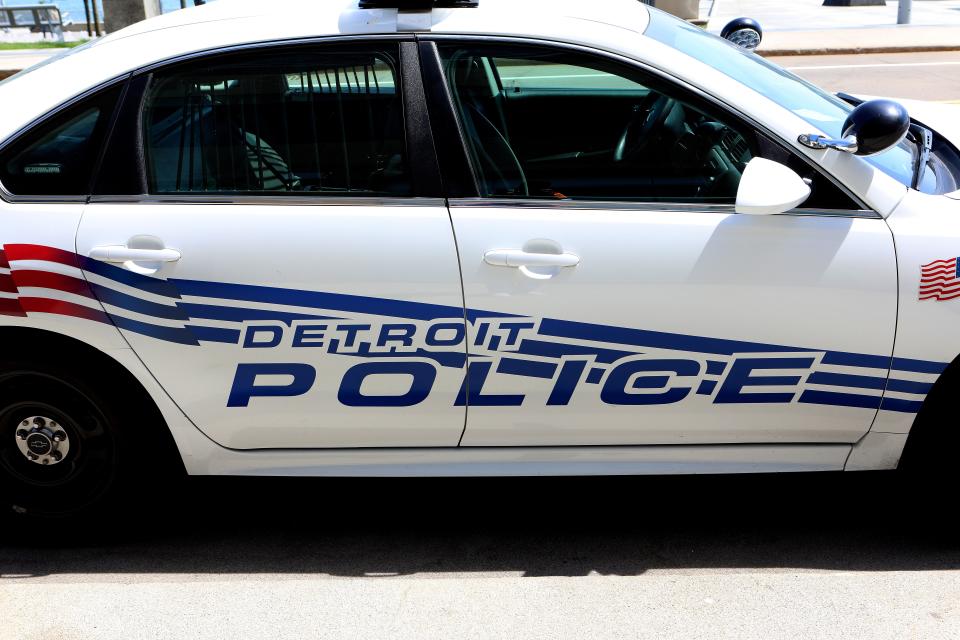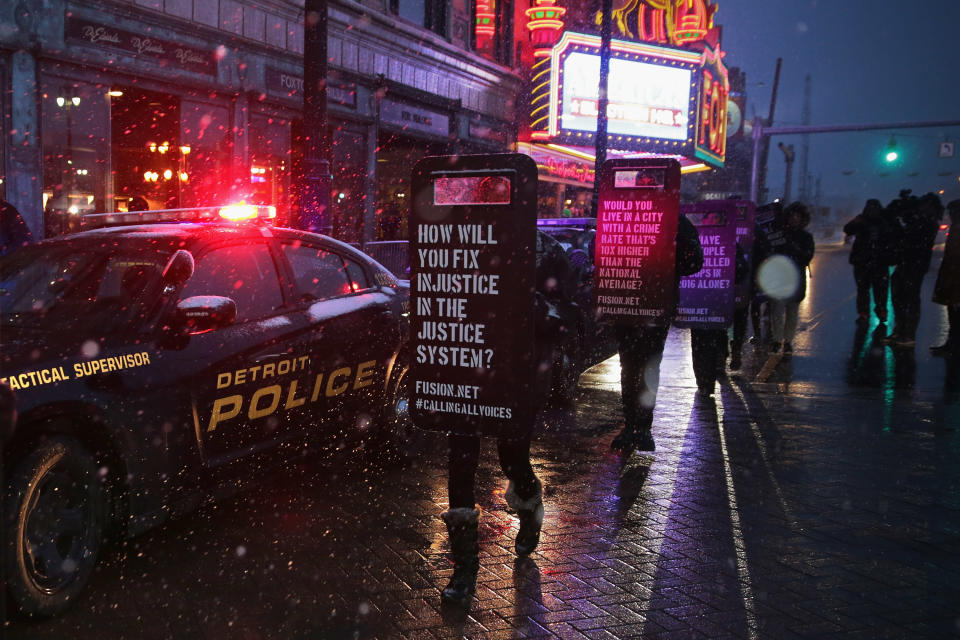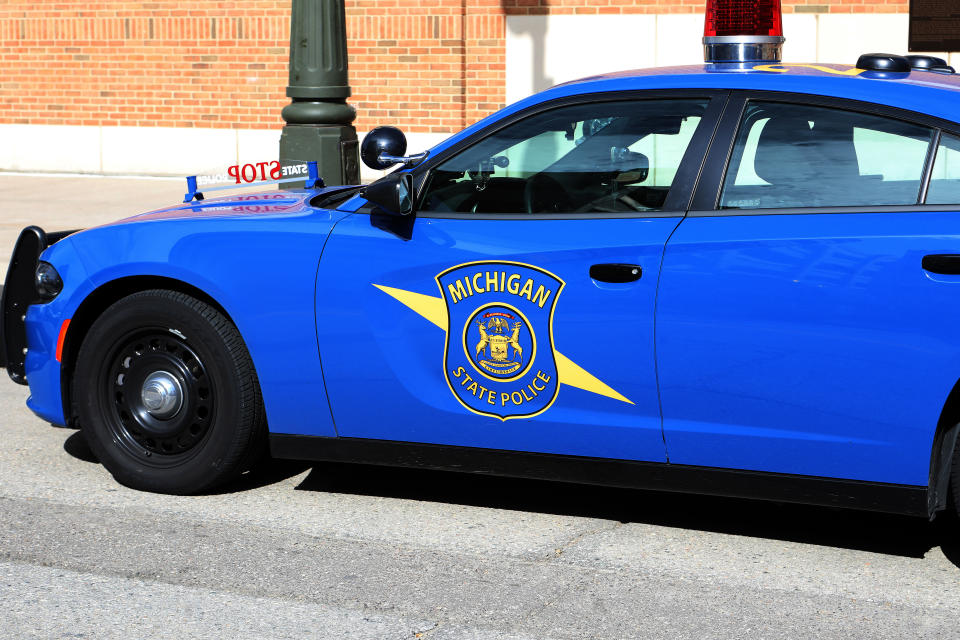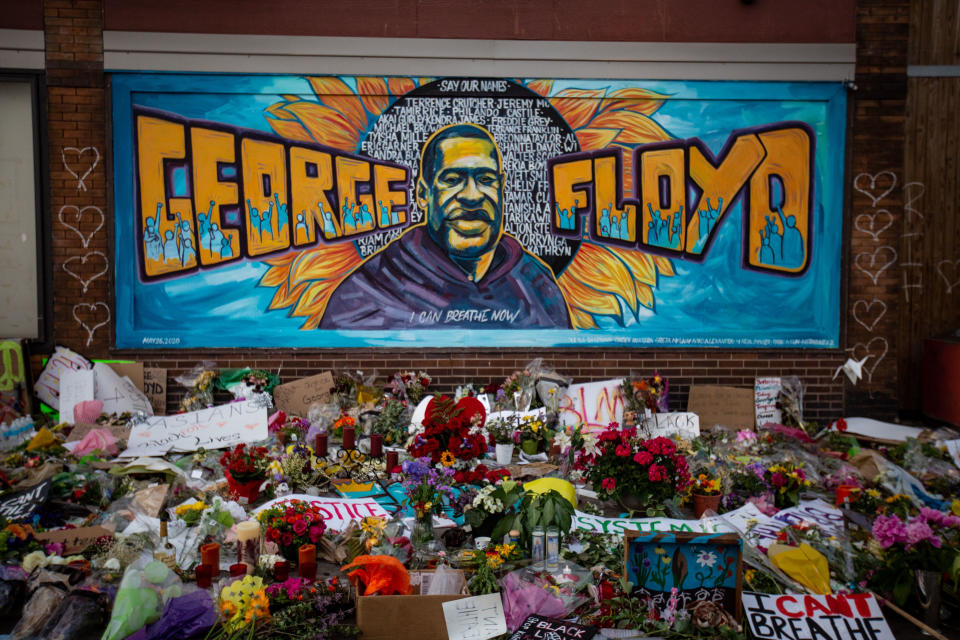Driving while black is real and the aftermath has lasting effects

The death of George Floyd while in police custody in Minneapolis prompted some reflection about some experiences I've gone through dealing with police. The specter of "driving while black" is real. Here's my story. Just know: I'm not alone.
I can’t remember the exact day, only that it was a Friday night several years ago. It wasn’t my first encounter with the police, but it’s the one that’s affected my experiences with them ever since — and honestly, in the immediate aftermath, I didn’t take the time to negotiate its lasting effects.
Getting pulled over by the police produces a roller coaster of emotions — fear, anger, curiosity — that cannot be explored in the moment. Almost as if every time, someone who looks like me needs a post-encounter presser to flesh these things out.
On this night, I wasn’t far from a postgame news conference. In fact, I’d just left The Palace of Auburn Hills following a Pistons game back when I was covering them for the Detroit News. The details surrounding the night are almost hazy, but some aspects and emotions are unforgettable.
I was excited, headed to visit a close family member who just purchased a new car. It was late, well after 11 p.m., and although I was no longer an official Detroit resident, it was still home. I never felt uncomfortable in many sections of the city, even the dangerous ones.
My companions on this night were usual ones — music and stat sheets from the night’s game in the passenger seat that I would often glance at while at red lights. I confess, catching an unexpected stat or trend could leave me deep in thought and maybe someone would have to honk their horn to snap me back to reality. Sirens could be around, sometimes signaling trouble, but it could serve as little more than background noise most days. It was just part of the package, no reason to freak out.
But when those sirens began to hit more than my peripheral vision, it felt different. I immediately looked at my speedometer, thinking my leadfoot was about to cost me, but I wasn’t speeding.
Being pulled over wasn’t an irregular occurrence, so there wasn’t much anxiety. Perhaps my mood — buoyed by putting a couple of newspaper editions to bed and going to see my then-closest relative — let my guard down.
‘Hey, can someone tell me what’s going on?’
I had no clue what was coming when I pulled over to the side of the road.
I knew the rules, no matter what my mood was. I’m no fool. It was ingrained in me by my father and my best friend’s father who took us to driver’s training when we were 14 years old.
Hands on the wheel, 10 and 2.
Everything visible.
Calm, polite demeanor — yes sir, no sir — even when you’re faced with an aggressive officer.
Keeping your self-respect was second to staying alive.
At 14 years old, the stage where immaturity was the word of the day and our relative inexperience was no secret, the message was clear: get home safely. By any means necessary.
“License and registration, sir,” the officer said.
I politely handed everything over, and in that moment I didn’t even realize what I was getting pulled over for because nothing was said to me. Soon, though, one squad car turned to four and I began to get nervous at the extra personnel.
The officer returned and asked me to take off my seat belt and to open my door. Slowly, I complied but I was unnerved and puzzled.
In one swoop, the white female officer physically yanked me from my car, and the other officers around started to move me away from my vehicle. Sometimes things happen so fast, there’s no fluid thought.
This was one of those moments. “Hey, can someone tell me what’s going on?” I asked to silence.
It was a cold night, and although I had a coat on, Detroit isn’t the kind of place you want to stand idly about outside approaching midnight. My questions were ignored and I could see the officer ransacking my car, going through every compartment, throwing papers all around.
I became an alphabet soup of all those aforementioned emotions, capitalized by confusion. “Who do they think I am?” I wondered, followed by “What’s gonna happen to me?”
I’m not in handcuffs, but I might as well have been. Ten officers all around, watching, and a couple had their hands near their holsters — I didn’t even want to sneeze.
But as I looked around, trying to find my calm, I noticed every car from every side of the road had slowed down to look at the spectacle this had become. As ignored as I felt, I damn sure felt seen and embarrassed.
You know the stereotypes, black men being criminalized at an early age, and having to deal with how the world sees you. It didn’t matter that I was a writer or a law-abiding citizen, nor did I ever believe I had some level of privilege because of either.
You’re born black, you can’t run from it even if you tried. And the first place your blackness becomes weaponized is with the police.
But you can’t let that emotion consume you, because you’ll live up to the “Angry Black Man” label. There’s no place to store this feeling in your psyche, it lingers around until it doesn’t.

Then the anger started setting in because I still had no answers. There were black cops, white cops and common courtesy was in short supply.
One of the officers — he may have been Latino — walked over to me and could probably see the steam from me at this point. He looked down as my coat was open.
He saw my lanyard, indicating I was a member of the media. I could lose things if I didn’t keep them close — my late grandfather would often call me “Badwill” and say I’d lose my head if it wasn’t attached to my neck — so I never took my lanyard off until I was home.
“Wait, what do you do?” he asked.
“I’m Vincent Goodwill, I cover the Pistons for the Detroit News,” I said slowly, trying not to convey my annoyance.
“There was a game tonight?” he asked.
“Yes. Can you tell me what’s going on? Nobody will talk to me.”
From that moment he started informing other officers around. Not that he knew who I was or anything, but something was going on. He returned with an almost-sheepish look on his face.
“They’ll be done in a minute,” he said. “We’ll let you go. You see, there was a car that apparently fit the description of a vehicle used in a shooting tonight.”
Everything started getting tense on me, I could feel my body getting hot in the bitter cold. My adrenaline was turning to rage.
“I’ve been in Auburn Hills since rush hour, sir,” I said to him.
“I understand, sir,” he said, as the officer finished up a search I didn’t grant permission to conduct (I learned the phrase “probable cause” shortly thereafter).
The officers who had no problem manhandling me began to act as if I was invisible at that point. Nobody looked at me or said a word, but I was convinced my lanyard saved me plenty of aggravation on top of the humiliation I was already experiencing.
If there was very little to stop the police from believing I was a criminal in the moment, they would’ve had no problem taking me to the station that night and throwing me into a cell. My skin color was the first piece of evidence, the strongest indicator of guilt.
I went about my way, without apology and headed straight to my cousin’s house, even joking off the experience with, “They said my car was used in a shooting tonight. I gotta be some kind of hitman to leave in the middle of a game, commit a crime and have nobody notice it.”
Being black means you tuck away those moments, because everybody has a story. No sense in negotiating those feelings publicly or in any other setting.
But that was the root of every police interaction I’ve had since.
Sweaty palms. Nerves. Anger. “What’s next?”
I didn’t tell anyone I was close to about that night, no sense in worrying over a situation that didn’t turn out as bad as it could’ve. But, I found myself talking to a couple of players about it before the next Pistons home game — you wind up having the most random conversations with these guys through the course of 82 games and discover the weirdest commonalities.
One of the writers on the beat, I believe it was David Mayo of MLive Media Group, was talking to me about it on press row. Mayo, a white man in his 50s, was not of the mind that I was paranoid.
A black fan behind us heard our conversation and tapped me during halftime.
“Hey, I couldn’t help but overhear,” he said. “What happened to you?”
I politely said, “Aww, it was nothing,” until he identified himself as a Detroit Police officer.
He apologized and gave me his card, saying to reach out if anything like that ever happened again.
I mostly kept the same demeanor, going about my business. The pieces didn’t fit until years later, that feeling of hopeless rage bubbling up inside, juxtaposed with the duty I felt to stay alive during these interactions.
‘Sir, get your hands out of your pocket’
A year later, I went to a park with a friend, just to clear my head. It was past dusk and the park was closed, unbeknownst to either of us.
Shortly after sitting on a park bench in Southfield, Michigan, two police cars pulled up with flashlights focused on me, saying the park was closed.
I apologized quickly and began heading to my car before one of the officers spoke up, asking to run my license. I made no fuss, taking it out and placing my hands inside my thin hoodie because it was getting cold.
“Sir, get your hands out of your pocket. You could have a weapon,” the officer said.
I turned the pockets inside out to show I wasn’t carrying anything and just explained I was a little chilly. While waiting, I mistakenly stepped in mud and damaged my gym shoes.
“Damn it,” I said instinctively and folded my arms.

“Hey! You put your hands back in your pockets, I’m gonna arrest you!” he barked.
I’m agitated at this point. I tried to stay calm and reiterated my hands weren’t in my pocket, that I wasn’t carrying a weapon and that I hadn’t broken any laws.
The cop got louder, upset that I asserted myself, I suppose. That same feeling, the threat of power being exerted over me from a year ago, made me defensive for the slightest moment. I grabbed the fabric of my hoodie, just needing to hold onto something to center myself.
I quickly snapped out of it when my friend called me by my birth name — “Vincent!” — a name no one calls me.
“Just get home safely,” became the voice in my head.
I endured the rest of the ordeal with the two cops trying to rile me up again — and mind you, I was merely sitting in a public park.
I drove home quietly and cleaned up my shoes immediately. I scrubbed my aggression and frustration away, unaware of what I was harboring and how dangerous the anger was inside. I haven’t worn them since; I try my best not to look at them. The memory burns.
‘No, I don’t grant you permission’
My final incident came four years ago, driving from Chicago to Detroit on Fourth of July weekend.
On Interstate 94, about three hours from Detroit, a sheriff’s vehicle began following me for miles before finally pulling me over.
The anxiety of “will I or won’t I be pulled over” is indescribable.
It happens so often, you almost feel as if it’s a game to them — to see if you’ll break, to see if you’ll run because, of course, you’re a criminal, right?
As soon as I roll my passenger window down, before the officer asks for any documentation, the dreaded words come out: “Your car smells like weed. Are you smoking weed, sir?”
A smirk immediately hit my face, given the rural area we’re in. I don’t smoke and there was nothing in the air. Of course, I found myself standing outside my vehicle moments later, with the officer asking to search it under the suspicion of drugs.
This is where “probable cause” comes in. “No, I don’t grant you permission,” I said calmly. “You don’t have cause, so you’ll have to get a warrant.”
I’m subsequently detained, sitting in the back of the sheriff’s truck, looking dead center at a shotgun in the passenger seat. The possibility of death is never far was the reminder.
He asks twice more, and although I could’ve granted him permission to search a vehicle that had nothing but shoes in it, my tolerance for such experiences had run out. I knew my rights and self-respect was what I needed to carry with me.
I sat in that truck for a half-hour while the officer tried to find any reason to take my dignity away, playing this game of chicken. With nothing on my record and knowing I wasn’t budging, he let me go.
I did the same thing as usual: laughed it off publicly, but dealing with it internally became more difficult than ever.

Each experience stripped away something, and even though I never had a Pollyannaish point of view of such matters, the anxiousness grew, along with my aggravation. Seeing the anger explode over the past few days — of course, there are exceptions — feels like a buildup of different experiences that could no longer be ignored as opposed to one incident being more powerful than the last.
It’s not just George Floyd’s death. It’s Tamir Rice and Freddie Gray and Sandra Bland and so many others that we were told to swallow over the years. So many instances of not being believed, even in death and being vilified as justification to defend the blue line, or outright racism.
People are fed up. Yes, afraid and fearful and with a variety of other emotions, but anger is what’s being seen today.
Black people walk around every day with that feeling, that apprehension and the paranoia that the next time may be “the time.” It could be me on that video, screaming for my life just because someone with a badge decides it’s my day to die.
You don’t live in complete fear, you just have the awareness — that a split-second thought, your car or even some smell in the air that has nothing to do with you — can produce a confrontation with potential for disastrous results.
What police don’t see is everything you’ve been through and everything you have to tell yourself before you roll down your window or open your door.
They don't know your triggers, and sometimes, neither do we.
But through this process, I've learned mine started on that Friday night, leaving a game with that lanyard around my neck.
Thank goodness there wasn't a knee on it by the end.
More from Yahoo Sports:

